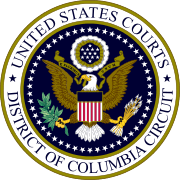United States v. Fenwick
| United States v. Fenwick |
|---|
Circuit Court, District of Columbia |
| April 1836 Term |
| Full case name: |
United States v. Fenwick |
| Citations: |
|
| Prior history: |
Judgment for the Appellant, appeal from the United States District Court for the District of Columbia |
| Subsequent history: |
|
|
| Holding |
| Conviction for rioting. |
| Court membership |
|
|
| Case opinions |
|
|
| Laws applied |
| |
 |
Wikisource has original text related to this article:
|
United States v. Fenwick, 13,387 (D.C. Cir. 1836), was a decision of the United States District Court for the District of Columbia that was handed down April 7, 1836. It confirmed the right of a defendant in a criminal case not to have the judge render a decision on motions until all arguments have been made, to defer making those arguments until the jury is empaneled, and to make those legal arguments to the jury.
Impact
The case has been cited by proponents of jury nullification because the jury was allowed to decide an issue of law.[1]
See also
References and external links
